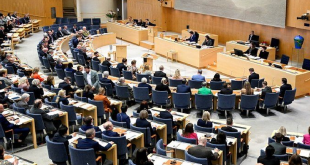24 September, 2019
By Syed Hussain Ali Sajjad (Bureau Chief)
 NEW DELHI: As it was decided to add the implementation of a uniform civil code in Article 44 of the Directive principles of the Constitution specifying, “The State shall endeavour to secure for citizens a uniform civil code throughout the territory of India” and in this continuation after the victory on Triple Talaq bill in both the houses Lok Sabha and Rajya Sabha with cheers of ruling party Member of Parliament and happiness expressed by the victim women who suffered from instant Triple Talaq and also some sects of Islam in which Triple Talaq is against the Islamic Law, Quraan and sunnat-e-Nabavi (s.a.w.s). While a large section of the Muslims see it as interference in Shariah Law by the Government and condemn the stand of some stubborn Clerics in favor of instant Triple Talaq thus bringing a bad name to Islam.
NEW DELHI: As it was decided to add the implementation of a uniform civil code in Article 44 of the Directive principles of the Constitution specifying, “The State shall endeavour to secure for citizens a uniform civil code throughout the territory of India” and in this continuation after the victory on Triple Talaq bill in both the houses Lok Sabha and Rajya Sabha with cheers of ruling party Member of Parliament and happiness expressed by the victim women who suffered from instant Triple Talaq and also some sects of Islam in which Triple Talaq is against the Islamic Law, Quraan and sunnat-e-Nabavi (s.a.w.s). While a large section of the Muslims see it as interference in Shariah Law by the Government and condemn the stand of some stubborn Clerics in favor of instant Triple Talaq thus bringing a bad name to Islam.
Some Non-Muslim Scholars, Religious Personalities and Political leaders think and believe that whatever Muslims or some stubborn Ulama, Priest, Qazi and wrong religious personalities are doing and practicing is Islam but contrary to that, Muslims has to obey and practice Islamic Law (Shariat) as per Quran and sunnat, to be called as Muslim.
 It was observed while watching ABP News Channel, in a debate organized to prorogate, Common Civil Code sponsored by the Government of India, intend to introduced and implement in India irrespective of cast, creed and Religion.
It was observed while watching ABP News Channel, in a debate organized to prorogate, Common Civil Code sponsored by the Government of India, intend to introduced and implement in India irrespective of cast, creed and Religion.
The Anchor by name Romana Khan was enquiring with the Muslim participants and pressurizing them to give the answer of her question in “yes or No” whether they express their views in favor of “Common Civil Code” While Viqar leader of All India Majlis-e-Itehad-ul-Muslimeen (AIMIM) was highlighting the anchor Romana that in Islam four Marriages are allowed according to “Quran” under certain conditions, whether such a proposal has been include in Common Civil Code?” She turned deaf ears and pressurize him to reply in “yes or No,” it is not possible to a follower of Islam (men or women) to opine against the Sermon (Ayet) of “Quran”.
NUMBER OF MARRIAGES PERMISIBLE UNDER CERTAIN CONDITIONS IN ISLAM:
A Muslim male is permitted to perform more than one marriage limited to four at a time, it is not obligatory (Wajib). If a man after his first marriage wants to marry another woman, Quran says in Ayet No.3 of Surah No.4- SURAH AL-NISAA (surah regarding women)
 وَإِنْ خِفْتُمْ أَلَّا تُقْسِطُوا فِي الْيَتَامَىٰ فَانْكِحُوا مَا طَابَ لَكُمْ مِنَ النِّسَاءِ مَثْنَىٰ وَثُلَاثَ وَرُبَاعَ ۖ فَإِنْ خِفْتُمْ أَلَّا تَعْدِلُوا فَوَاحِدَةً أَوْ مَا مَلَكَتْ أَيْمَانُكُمْ ۚ ذَٰلِكَ أَدْنَىٰ أَلَّا تَعُولُوا
وَإِنْ خِفْتُمْ أَلَّا تُقْسِطُوا فِي الْيَتَامَىٰ فَانْكِحُوا مَا طَابَ لَكُمْ مِنَ النِّسَاءِ مَثْنَىٰ وَثُلَاثَ وَرُبَاعَ ۖ فَإِنْ خِفْتُمْ أَلَّا تَعْدِلُوا فَوَاحِدَةً أَوْ مَا مَلَكَتْ أَيْمَانُكُمْ ۚ ذَٰلِكَ أَدْنَىٰ أَلَّا تَعُولُوا
“And if you fear that you will not deal justly with the orphan girls, then marry those that please you of [other] women, two or three or four but if you fear that you will not be just, then [marry only] one or those right hand possesses. That is more suitable that you may not incline [to injustice]”.
In the light of above mentioned Quranic Ayet, if any follower of Islam male or female disagree and against more than one marriage or did not follow the commands of Quran, He/She will be exit from Islam and He/She will not be a Muslim. The female can demand her husband to follow Islamic Laws if he intends to marry more than one wife. In case, the male is incapable of abiding the dictates of divine law he must hold on to the first marriage as per Quranic Ayet No 3 Surah No 4 Surah Al Nisa.
The does and does not are depicted in “Quran and Sunnah” for example if a non-Muslim married couple intend to get separated (want to Talaq) till separated, if husband is non-earner and have no source of livelihood as against his wife ,wife has to pay “alimony” to her Spouse contrary to Islamic dictates where the women never has to pay any alimony to her husband but husband has to pay her maintenance during Talaq-e- Rajaee (Ruju) or has to pay three months expenditure after given the Talaq “BA EEN” (Final Talaq).
MIRAS (MATRUKA PROPERTY OR PROPERTIES)
Regarding Property (Matruka) i.e left over by the deceased person i.e A person having the property in his name died without any will his property will be called as “MATRUKA PROPERTY” i.e left over for his Legal heirs (Wife or wives, children, son or sons, daughter or daughters). The Property/Properties will divide in the light of the commands of Quranic Law as hereunder:
The following quotations (Quranic Law) are quoted from Surah No 4 Al- Nisa, Ayet Nos 7, 8, 11, 12, 19 and 176.
 لِلرِّجَالِ نَصِيبٌ مِمَّا تَرَكَ الْوَالِدَانِ وَالْأَقْرَبُونَ وَلِلنِّسَاءِ نَصِيبٌ مِمَّا تَرَكَ الْوَالِدَانِ وَالْأَقْرَبُونَ مِمَّا قَلَّ مِنْهُ أَوْ كَثُرَ ۚ نَصِيبًا مَفْرُوضًا
لِلرِّجَالِ نَصِيبٌ مِمَّا تَرَكَ الْوَالِدَانِ وَالْأَقْرَبُونَ وَلِلنِّسَاءِ نَصِيبٌ مِمَّا تَرَكَ الْوَالِدَانِ وَالْأَقْرَبُونَ مِمَّا قَلَّ مِنْهُ أَوْ كَثُرَ ۚ نَصِيبًا مَفْرُوضًا
(Ayet No 7): For men is a share of what the parents and close relatives leave, and for women is a share of what the parents and close relatives leave, be it little or much – an obligatory share.
وَإِذَا حَضَرَ الْقِسْمَةَ أُولُو الْقُرْبَىٰ وَالْيَتَامَىٰ وَالْمَسَاكِينُ فَارْزُقُوهُمْ مِنْهُ وَقُولُوا لَهُمْ قَوْلًا مَعْرُوفًا
(Ayet No 8): And when [other] near of kin and orphans and needy persons are present at the distribution [of inheritance], give them something thereof for their sustenance, and speak unto them in a kindly way.
يُوصِيكُمُ اللَّهُ فِي أَوْلَادِكُمْ ۖ لِلذَّكَرِ مِثْلُ حَظِّ الْأُنْثَيَيْنِ ۚ فَإِنْ كُنَّ نِسَاءً فَوْقَ اثْنَتَيْنِ فَلَهُنَّ ثُلُثَا مَا تَرَكَ ۖ وَإِنْ كَانَتْ وَاحِدَةً فَلَهَا النِّصْفُ ۚ وَلِأَبَوَيْهِ لِكُلِّ وَاحِدٍ مِنْهُمَا السُّدُسُ مِمَّا تَرَكَ إِنْ كَانَ لَهُ وَلَدٌ ۚ فَإِنْ لَمْ يَكُنْ لَهُ وَلَدٌ وَوَرِثَهُ أَبَوَاهُ فَلِأُمِّهِ الثُّلُثُ ۚ فَإِنْ كَانَ لَهُ إِخْوَةٌ فَلِأُمِّهِ السُّدُسُ ۚ مِنْ بَعْدِ وَصِيَّةٍ يُوصِي بِهَا أَوْ دَيْنٍ ۗ  آبَاؤُكُمْ وَأَبْنَاؤُكُمْ لَا تَدْرُونَ أَيُّهُمْ أَقْرَبُ لَكُمْ نَفْعًا ۚ فَرِيضَةً مِنَ اللَّهِ ۗ إِنَّ اللَّهَ كَانَ عَلِيمًا حَكِيمًا
آبَاؤُكُمْ وَأَبْنَاؤُكُمْ لَا تَدْرُونَ أَيُّهُمْ أَقْرَبُ لَكُمْ نَفْعًا ۚ فَرِيضَةً مِنَ اللَّهِ ۗ إِنَّ اللَّهَ كَانَ عَلِيمًا حَكِيمًا
(Ayet No 11): Allah commands you regarding your children: the share of the male will be twice that of the female. If you leave only two ˹or more˺ females, their share is two-thirds of the estate. But if there is only one female, her share will be one-half. Each parent is entitled to one-sixth if you leave offspring but if you are childless and your parents are the only heirs, then your mother will receive one-third but if you leave siblings, then your mother will receive one-sixth after the fulfilment of bequests and debts. ˹Be fair to˺ your parents and children, as you do not ˹fully˺ know who is more beneficial to you.˹This is an obligation from Allah. Surely Allah is All-Knowing, All-Wise.
وَلَكُمْ نِصْفُ مَا تَرَكَ أَزْوَاجُكُمْ إِنْ لَمْ يَكُنْ لَهُنَّ وَلَدٌ ۚ فَإِنْ كَانَ لَهُنَّ وَلَدٌ فَلَكُمُ الرُّبُعُ مِمَّا تَرَكْنَ ۚ مِنْ بَعْدِ وَصِيَّةٍ يُوصِينَ بِهَا أَوْ دَيْنٍ ۚ وَلَهُنَّ الرُّبُعُ مِمَّا تَرَكْتُمْ إِنْ لَمْ يَكُنْ لَكُمْ وَلَدٌ ۚ فَإِنْ كَانَ لَكُمْ وَلَدٌ فَلَهُنَّ الثُّمُنُ  مِمَّا تَرَكْتُمْ ۚ مِنْ بَعْدِ وَصِيَّةٍ تُوصُونَ بِهَا أَوْ دَيْنٍ ۗ وَإِنْ كَانَ رَجُلٌ يُورَثُ كَلَالَةً أَوِ امْرَأَةٌ وَلَهُ أَخٌ أَوْ أُخْتٌ فَلِكُلِّ وَاحِدٍ مِنْهُمَا السُّدُسُ ۚ فَإِنْ كَانُوا أَكْثَرَ مِنْ ذَٰلِكَ فَهُمْ شُرَكَاءُ فِي الثُّلُثِ ۚ مِنْ بَعْدِ وَصِيَّةٍ يُوصَىٰ بِهَا أَوْ دَيْنٍ غَيْرَ مُضَارٍّ ۚ وَصِيَّةً مِنَ اللَّهِ ۗ وَاللَّهُ عَلِيمٌ حَلِيمٌ
مِمَّا تَرَكْتُمْ ۚ مِنْ بَعْدِ وَصِيَّةٍ تُوصُونَ بِهَا أَوْ دَيْنٍ ۗ وَإِنْ كَانَ رَجُلٌ يُورَثُ كَلَالَةً أَوِ امْرَأَةٌ وَلَهُ أَخٌ أَوْ أُخْتٌ فَلِكُلِّ وَاحِدٍ مِنْهُمَا السُّدُسُ ۚ فَإِنْ كَانُوا أَكْثَرَ مِنْ ذَٰلِكَ فَهُمْ شُرَكَاءُ فِي الثُّلُثِ ۚ مِنْ بَعْدِ وَصِيَّةٍ يُوصَىٰ بِهَا أَوْ دَيْنٍ غَيْرَ مُضَارٍّ ۚ وَصِيَّةً مِنَ اللَّهِ ۗ وَاللَّهُ عَلِيمٌ حَلِيمٌ
(Ayet No 12): You will inherit half of what your wives leave if they are childless. But if they have children, then ˹your share is˺ one-fourth of the estate—after the fulfilment of bequests and debts. And your wives will inherit one-fourth of what you leave if you are childless. But if you have children, then your wives will receive one-eighth of your estate—after the fulfilment of bequests and debts. And if a man or a woman leaves neither parents nor children but only a brother or a sister ˹from their mother’s side˺, they will each inherit one-sixth, but if they are more than one, they ˹all˺ will share one-third of the estate After the fulfillment of bequests and debts without harm ˹to the heirs˺. This is˺ a commandment from Allah. And Allah is All-Knowing, Most Forbearing.
يَا أَيُّهَا الَّذِينَ آمَنُوا لَا يَحِلُّ لَكُمْ أَنْ تَرِثُوا النِّسَاءَ كَرْهًا ۖ وَلَا تَعْضُلُوهُنَّ لِتَذْهَبُوا بِبَعْضِ مَا آتَيْتُمُوهُنَّ إِلَّا  أَنْ يَأْتِينَ بِفَاحِشَةٍ مُبَيِّنَةٍ ۚ وَعَاشِرُوهُنَّ بِالْمَعْرُوفِ ۚ فَإِنْ كَرِهْتُمُوهُنَّ فَعَسَىٰ أَنْ تَكْرَهُوا شَيْئًا وَيَجْعَلَ اللَّهُ فِيهِ خَيْرًا كَثِيرًا
أَنْ يَأْتِينَ بِفَاحِشَةٍ مُبَيِّنَةٍ ۚ وَعَاشِرُوهُنَّ بِالْمَعْرُوفِ ۚ فَإِنْ كَرِهْتُمُوهُنَّ فَعَسَىٰ أَنْ تَكْرَهُوا شَيْئًا وَيَجْعَلَ اللَّهُ فِيهِ خَيْرًا كَثِيرًا
(Ayet No 19): O ye who believe! It is not lawful for you forcibly to inherit the women (of your deceased kinsmen), nor (that) ye should put constraint upon them that ye may take away a part of that which ye have given them, unless they be guilty of flagrant lewdness. But consort with them in kindness, for if ye hate them it may happen that ye hate a thing wherein Allah hath placed much good.
يَسْتَفْتُونَكَ قُلِ اللَّهُ يُفْتِيكُمْ فِي الْكَلَالَةِ ۚ إِنِ امْرُؤٌ هَلَكَ لَيْسَ لَهُ وَلَدٌ وَلَهُ أُخْتٌ فَلَهَا نِصْفُ مَا تَرَكَ ۚ وَهُوَ يَرِثُهَا إِنْ لَمْ يَكُنْ لَهَا وَلَدٌ ۚ فَإِنْ كَانَتَا اثْنَتَيْنِ فَلَهُمَا الثُّلُثَانِ مِمَّا تَرَكَ ۚ وَإِنْ كَانُوا إِخْوَةً رِجَالًا وَنِسَاءً فَلِلذَّكَرِ مِثْلُ حَظِّ الْأُنْثَيَيْنِ ۗ يُبَيِّنُ اللَّهُ لَكُمْ أَنْ تَضِلُّوا ۗ وَاللَّهُ بِكُلِّ شَيْءٍ عَلِيمٌ
 (Ayet No 176): They ask you ˹for a ruling, O Prophet˺. Say, “Allah gives you a ruling regarding those who die without children or parents.” If a man dies childless and leaves behind a sister, she will inherit one-half of his estate, whereas her brother will inherit all of her estate if she dies childless. If this person leaves behind two sisters, they together will inherit two-thirds of the estate. But if the deceased leaves male and female siblings, a male’s share will be equal to that of two females. Allah makes ˹this˺ clear to you so you do not go astray. And Allah has ˹perfect˺ knowledge of all things.
(Ayet No 176): They ask you ˹for a ruling, O Prophet˺. Say, “Allah gives you a ruling regarding those who die without children or parents.” If a man dies childless and leaves behind a sister, she will inherit one-half of his estate, whereas her brother will inherit all of her estate if she dies childless. If this person leaves behind two sisters, they together will inherit two-thirds of the estate. But if the deceased leaves male and female siblings, a male’s share will be equal to that of two females. Allah makes ˹this˺ clear to you so you do not go astray. And Allah has ˹perfect˺ knowledge of all things.
The Matruka property will be divided whether immoveable or movable as per the share/shares depicted in Quran as quoted above. In case of a property not supposed to be partition such property can be sold and as per the share/shares the sale proceeds will be appropriated among the heirs, a definite share is prescribed. In the event of Wife or wives, male or female child died during the life time of the owner of the property the deceased will not get any share in the property.
 Common Civil Code goes against the Islamic law and a Muslim practice Common Civil Code that means he is going against Quranic laws, Sharah-e-Mohammadi (Mohammedan Law) and will no more be called a Muslim.
Common Civil Code goes against the Islamic law and a Muslim practice Common Civil Code that means he is going against Quranic laws, Sharah-e-Mohammadi (Mohammedan Law) and will no more be called a Muslim.
MOST IMPORTANT POINT:
India is a SOVEREIGN, DEMOCRATIC REPUBLIC State secure to all its citizens:
Justice: Social, economic and political.
Liberty: of thought, expression, belief, faith and worship.
Equality: of status and of opportunity and
Fraternity: assuring the dignity of individual and the unity of the Nation.
Conclusively, the Uniform Civil Code place a set of laws to govern personal matters of all citizens irrespective of religion is perhaps the need of the hour and ensuring that their fundamental and Constitutional rights are protected.
 Pressmediaofindia
Pressmediaofindia



